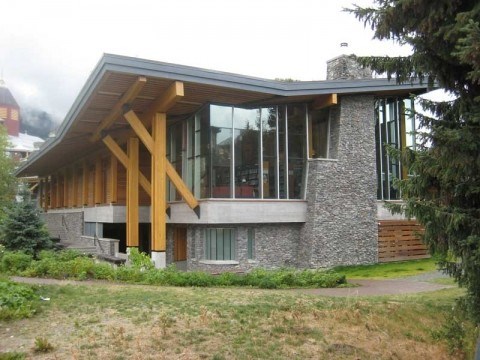Despite confusion last week, energy costs at Whistler's "green" library are not 300 per cent higher than estimated, Ted Battiston from Whistler's Centre for Sustainability clarified this week.
They are 35 per cent higher than predicted.
The manager of strategic energy and emissions explained he recently re-crunched the data and realized several factors were over-looked in the original estimate.
"When I first came across the numbers for fiscal 2008, they seemed high, and that is when I started looking more detailed into what was going on in the library," said Battiston, who has been tracking the Resort Municipality of Whistler's energy consumption since 2007, including propane, electricity, diesel and gasoline.
Battiston found the award-winning building's highest energy bills were coming from the beginning of 2008 - right after the building opened its doors to the public. Construction workers were still putting final touches onto the library at that time, which he suspects is why the numbers were skewed.
The manager of strategic energy and emissions then decided to look at the bills from the most recent 12-month period, August 2008 to August 2009, which show the library costs about $28,500 per year.
He said the other number he scrutinized was the architects' original energy estimate in 2005. Last week, Library Director Lauren Stara mistakenly pinned that figure at $7,000.
"The source of error, to some extent, was that Lauren suggested a number which is not accurate," said Battiston. "I went back and doubled checked the study she was referencing, and it was $13,000, not $7,000."
Of course $13,000 is still a long way from $28,500, said Battison, but that number was based on a library design that was significantly smaller than the actual building constructed on Main Street. The energy model has also changed somewhat over the years, he said.
"Put those pieces in, and we expect the building to operate at $21,000," said Battiston. "We are operating at $28,400 for the most recent 12 months, which is about 35 per cent over the model."
Over at the library, Stara said it has been a relief to learn the energy bills are not as far off estimates as she suspected last week.
"It was a good wake up call for us, and it was a good exercise to look at where these numbers came from, what is reality, and how far away we are from that," said the library director.
"The picture really is much better than what we thought it was."
Confusion over the Whistler Public Library's energy use drew heat at last week's council meeting, driving Councillor Ralph Forsyth to request a thorough report on energy use at all of the municipality's "green" buildings.
Forsyth, who sits on the library board, wanted to know whether the municipality was actually saving money by installing environmentally friendly features in its buildings, since such components often have high up-front costs.
However other councilors shot down his motion in a four to three vote.
At the time, Mayor Ken Melamed said he didn't need to see such a report and reducing energy emissions in the long run is the right way to go. And other councillors said such a report would be too time consuming to complete right now.
This week, Battiston said it is clear his team needs to do a better job letting council and the municipality's senior staff know the Whistler Centre for Sustainability is already tracking this data.
"Ultimately, I have to say that myself and my staff are not doing a very good job of communicating with council and senior staff that this exists," said Battiston. "It has been done for years."
He added that the library's energy use is in no way alarming.
"It is something that is not totally unexpected," he said. "That building is still new, and we are still commissioning it and getting the heat pumps and other things optimized. I would be more concerned if we were two or three years in and it was showing this kind of result."
It is normal for engineers to re-jig elements within a green building for a few years to get the heat costs down, said Battiston, and by this time next year, the municipality should have a better idea of what the numbers really are.
He added that already the state-of-the-art library is operating 15 per cent better than The Model National Energy Code of Canada for Buildings.




